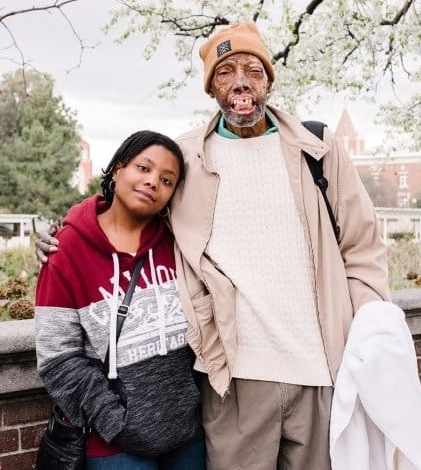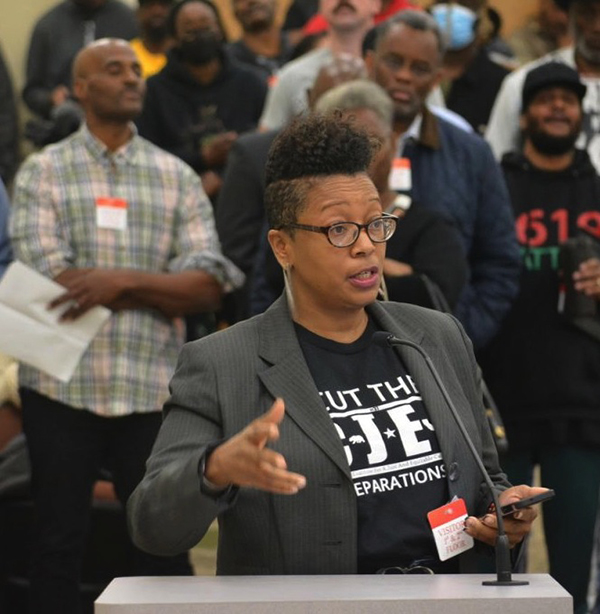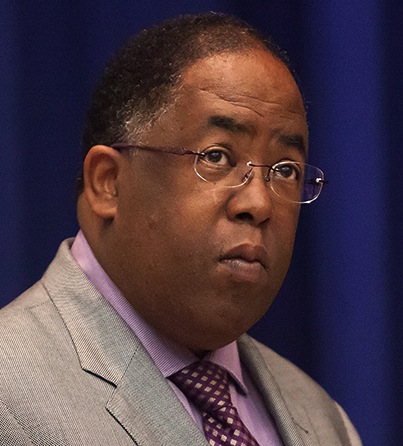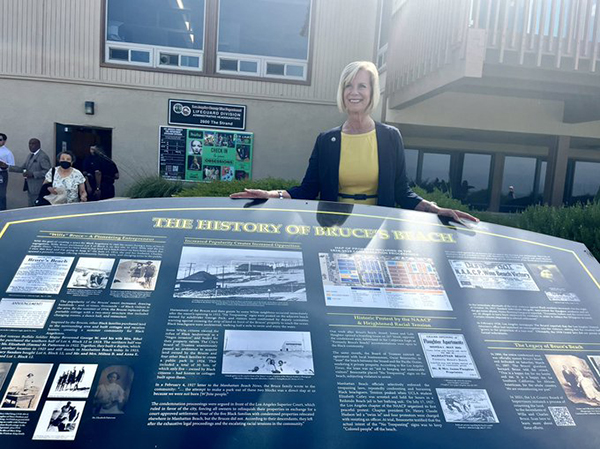By Darlene Donloe
Contributing Writer
LOS ANGELES — Robert Chelsea’s life was changed forever the night of Aug. 5, 2013, when a drunk driver on the freeway plowed into his car, which blew up, engulfing him in flames, melting away his face and burning 75% of his body.
It’s been nearly eight years since the crash and Chelsea, 70, is still recovering, still undergoing surgeries, still trying to lead as normal a life as possible while trying to form a relationship with the stranger he sees in the mirror every day.
That face looking back at him isn’t his. It’s that of a 62-year-old man he never knew. It’s the face of a donor — a stranger who died and whose face was given to Chelsea — making him the first Black person in the world to receive a full face transplant.
“When I look at myself, it’s like looking at another person,” Chelsea said. “I don’t see Robert Chelsea’s face. I see another man. I identify with Robert, but not this face. This face just covers me. I’m still getting used to it.”
Chelsea’s story is remarkable, miraculous, emotional and triumphant all at the same time.
On the night of the accident, he was going south on the San Gabriel River (605) Freeway heading to his home in Paramount.
Somewhere between the Glenn Anderson (105) Freeway and the Artesia (91) freeway, his car began to overheat, so he pulled over to the shoulder, stopped the car and called a friend to bring some water.
“While talking to him I saw a drunk driver who swerved from two lanes over to the shoulder,” Chelsea said. “He was in a small pickup truck and ran directly into me. My car went up in the air and came down. Seconds later it blew up.”
A good Samaritan and witness named Richard Robles pulled Chelsea from the burning car.
“I reached in, grabbed him and pulled him out,” said Robles in a BBC documentary about Chelsea’s transplant. “Robert’s first words to me were, ‘How’s the other driver?’
“I was conscious all this time, including when the ambulance came and they laid me on a gurney,” Chelsea said. “I went to sleep. I never woke up again until six months later. I went to sleep Aug. 5, 2013, and woke up in February of 2014.”
When he awoke, Chelsea, who had been transferred to the UC Irvine Medical Center, remembered what happened, but still “had no clue” about the gravity of the accident or the burns he sustained.
Chelsea underwent numerous surgeries, at least 40. He had another one last March.
One of the surgeries included the amputation of some of his fingers and toes because gangrene had set in.
It wasn’t until 10 months after the accident that Chelsea first saw his burned face in a reflection of an aluminum towel holder.
“I had no clue I looked the way I did,” said Chelsea, the father of a daughter named Ebony. “I was still me. I knew that God had allowed me to discover more glory. He has carried me for eight years.”
For someone who lost his face, endured tremendous pain and countless surgeries, plus the loss of several parts of his anatomy while enduring the scared, inquisitive stares of the public, Chelsea’s attitude is remarkably upbeat.
“People see you, but they try not to see you,” he said. “To address a person without intimidating them would be a relief.”
Before the accident, Chelsea, a former sales manager at a rubber stamp company, jokingly said his original face, “wasn’t turning any heads.”
Lena Cole Dennis met Chelsea in the early 1990s.
“He became a treasured family friend,” Dennis said. “As long as I’ve known him he has never wavered in his faith, his friendship or his commitments. He is such a nice man. When I see him, I see his joy to be alive. He’s a man of his word, with the word, who lives by the word.”
Chelsea’s daughter, Ebony, is admittedly having a hard time accepting her father’s new face.
“I didn’t understand it at first,” she said. It’s like he’s a science experiment. I’m easing into this. I’m better than I was before.”
Ebony, 32, who is a caretaker for both her father and her mother who are no longer together, is still getting used to her father’s new world and his new face.
“The part that I’m having a hard time with is knowing he’s the same dad, but he doesn’t look like my dad,” Ebony said. “Certain things shock me. Imagine having a man that was your dad for 31 years, and then you wake up and it’s a whole other man there. It’s sad that he has to open his mouth and speak for me to realize that’s my dad. I have to hear his voice to know that it’s my dad. I’m looking at a whole other man’s face. It’s hard, but I’m getting better.”
Everick Brown, 57, a married, father of two, is Chelsea’s godson. He thinks Chelsea looks like himself.
“I think he’s exactly the same person,” said Brown, an interior designer. “People think the accident caused him to be different. He is the same. In general, his bone structure is the same, eyeballs, teeth. What changed is his skin color and that he has hair. He didn’t have hair for decades. The new hair makes him look different than what he looked like before. He also lost about 40-50 pounds. I still see Robert. It’s probably one of the most amazing sights I’ve ever seen.”
It was May 2018 when Chelsea was first offered a face. He turned it down because it was too light. He waited a year to get a face closer to his natural coloring.
“When they started looking for the donors, we couldn’t find too many in the Black community,” Chelsea said. “So we widened the search for various shades. They found a donor. Some of the donors weren’t right, or the families wouldn’t consent to their loved one’s face being taken. That was an issue.”
In July 2019, Chelsea got the news that the hospital had identified a face for him. Within 24 hours he had to be packed and in Boston for surgery at Brigham and Women’s Hospital.
Dr. Bohdan Pomahac, the director of the Plastic Surgery Transplantation Program at Brigham and Women’s Hospital, is the surgeon who approved and performed Chelsea’s transplant.
“Robert is a unique man,” said Pomahac in the BBC documentary about Chelsea’s surgery. “Not a typical transplant candidate. He’s got a new nose, he’s got new lips, he’s got all the muscles and skin of the face and a big part of the scalp. I think we all know about disparities in health and health delivery and it’s good that African-American patients that suffer from major facial deformities are aware that there is an option for them.”
Disparities in health care, which cause Blacks to die at a higher rate than whites, and distrust of the medical establishment contribute to lower organ donations and transplants. Statistics show that only 17% of Blacks awaiting an organ transplant received one in 2015, while 30% of whites received one.
To this day, Chelsea isn’t keen on looking at himself every day.
“I’m far more concerned about functionality,” Chelsea said. “To be able to spit, gargle, drink, eat and kiss my daughter’s cheeks. I’m 70, I don’t need to look like a GQ model. I’m grateful I wasn’t in my 20s when it happened.”
The first partial face transplant was performed in France in 2005. As of September 2019, face transplants have been performed on more than 44 patients around the world, including 15 patients in the United States. Brigham and Women’s Hospital in Massachusetts has performed nine face transplants, which is the most of any other medical center in the United States.
Overall, Chelsea’s health is good. He takes 23 different medications, three of which are vital to saving his life. His doctors have advised him to watch what he eats, stay hydrated, watch the foods that could affect his kidneys, and wear 50 SFP sunscreen because the rays can affect a particular layer of skin. His diet is limited for several reasons.
While he was in the hospital two-thirds of his intestines were removed.
“The frame of my face was smaller than the frame of the donor,” he said. “They had to tighten some of it. I’m hoping to learn to drink out of a glass, cup or bottle eventually. I want to close the lips enough to hold the straw. My lips aren’t strong enough yet. I can pucker, but I can’t kiss. It’s coming along. I can’t control my lips enough to do that. The food I eat has to be softened.”
As of two months ago, Chelsea can now drink out of a straw, but his main goal is to be able to kiss his daughter’s cheeks.
“That’s what I want,” said Chelsea who remains optimistic. “Day by day, new mercies unfold. Whatever comes my way, I can face it.”
Darlene Donloe is a freelance reporter for Wave Newspapers who covers South Los Angeles. She can be reached at ddonloe@gmail.com.












